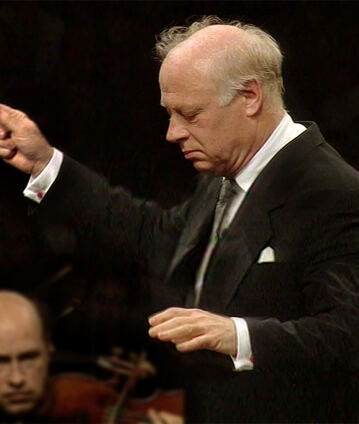1993 Europakonzert from London with Bernard Haitink and Frank Peter Zimmermann

London’s monumental Royal Albert Hall is one of the most impressive concert venues in Europe, and it was here, on 1 May 1993, that the Berliner Philharmoniker presented their third Europakonzert. On this occasion their musical partners were Bernard Haitink, who was then the music director of the city’s Royal Opera House, and – as the soloist in Mozart’s Violin Concerto No. 3 – Frank Peter Zimmermann. The high point of the concert was Stravinsky’s visionary ballet music to Le Sacre du printemps.
Opened in 1871, London’s Royal Albert Hall in South Kensington is one of the most impressive concert venues in Europe. Television audiences from all over the world are familiar with its auditorium – modelled on a classical amphitheatre and seating 5,500 concertgoers – from relays of the Last Night of the Proms, the final evening of the BBC’s annual season of summer concerts.
The first piece on the programme of the Europakonzert, Tchaikovsky’s fantasy overture based on Shakespeare’s Romeo and Juliet, was written at the suggestion of Mili Balakirev and premiered in Moscow in March 1870 – without great success. Tchaikovsky’s version of the most famous love story of all time was too unusual for the audiences of the day, and after the Viennese premiere in 1876, critic Eduard Hanslick called the overture, which is rightly very popular today, a “soulless battle of sound, raging with grey dissonances and wild noise”.
Stravinsky likewise encountered an almost universal lack of understanding when his Le Sacre du printemps was first performed in Paris in 1913. According to one eyewitness, “screams, insults, hoots, prolonged whistles drowned out the music, and then slaps and even boxing blows”. This value judgement on the audience’s part has in the meantime been corrected by music history, and Le Sacre du printemps has been rehabilitated as one of the most innovative and pioneering works of the twentieth century.
Mozart’s Violin Concerto in G major found a far more favourable response among its early listeners: “During supper that evening I played my Strasbourg concerto, it all went very smoothly. Everyone praised my beautiful pure tone.” Mozart was an extremely gifted violinist, who had tailor-made this piece to his own abilities, resulting in a cantabile masterpiece, and a modern-day virtuoso like Frank Peter Zimmermann can still move an audience to great heights of enthusiasm with this work.
© 1993 EuroArts Music International
Categories
Artists
Our recommendations
- The 1999 Europakonzert in Krakow with Bernard Haitink, Emanuel Ax and Christine Schäfer
- Daniel Barenboim conducts Mozart at the 2006 Europakonzert from Prague
- The 1995 Europakonzert from Florence with Zubin Mehta and Sarah Chang
- 2007 Europakonzert from Berlin with Simon Rattle, Lisa Batiashvili and Truls Mørk
- 2023 Europakonzert from Barcelona with Kirill Petrenko
- Europakonzert from Athens with Simon Rattle and Daniel Barenboim